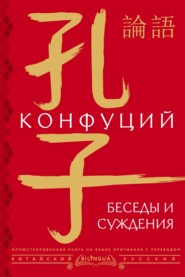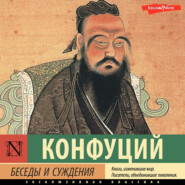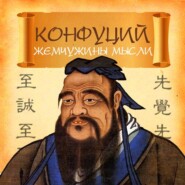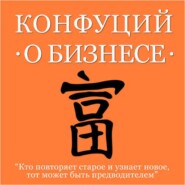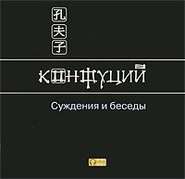По всем вопросам обращайтесь на: info@litportal.ru
(©) 2003-2024.
✖
Chinese Literature
Автор
Год написания книги
2018
Настройки чтения
Размер шрифта
Высота строк
Поля
"Then if you can be satisfied in so doing, do so. But to a gentleman, who is in mourning for a parent, the choicest food will not be palatable, nor will the listening to music be pleasant, nor will comforts of home make him happy in mind. Hence he does not do as you suggest. But if you are now happy in your mind, then do so."
Tsai Wo went out. And the Master went on to say, "It is want of human feeling in this man. After a child has lived three years it then breaks away from the tender nursing of its parents. And this three years' mourning is the customary mourning prevalent all over the empire. Can this man have enjoyed the three years of loving care from his parents?"
"Ah, it is difficult," said he, "to know what to make of those who are all day long cramming themselves with food and are without anything to apply their minds to! Are there no dice and chess players? Better, perhaps, join in that pursuit than do nothing at all!"
"Does a gentleman," asked Tsz-lu, "make much account of bravery?"
"Righteousness he counts higher," said the Master. "A gentleman who is brave without being just may become turbulent; while a common person who is brave and not just may end in becoming a highwayman."
Tsz-kung asked, "I suppose a gentleman will have his aversions as well as his likings?"
"Yes," replied the Master, "he will dislike those who talk much about other people's ill-deeds. He will dislike those who, when occupying inferior places, utter defamatory words against their superiors. He will dislike those who, though they may be brave, have no regard for propriety. And he will dislike those hastily decisive and venturesome spirits who are nevertheless so hampered by limited intellect."
"And you, too, Tsz-kung," he continued, "have your aversions, have you not?"
"I dislike," said he, "those plagiarists who wish to pass for wise persons. I dislike those people who wish their lack of humility to be taken for bravery. I dislike also those divulgers of secrets who think to be accounted straightforward."
"Of all others," said the Master, "women-servants and men-servants are the most difficult people to have the care of. Approach them in a familiar manner, and they take liberties; keep them at a distance, and they grumble."
Again, "When a man meets with odium at forty, he will do so to the end."
BOOK XVIII
Good Men in Seclusion—Duke of Chow to His Son
"In the reign of the last king of the Yin dynasty," Confucius I said, "there were three men of philanthropic spirit:—the viscount of Wei, who withdrew from him; the viscount of Ki, who became his bondsman; and Pi-kan, who reproved him and suffered death."
Hwúi of Liu-hiá, who filled the office of Chief Criminal Judge, was thrice dismissed. A person remarked to him, "Can you not yet bear to withdraw?" He replied, "If I act in a straightforward way in serving men, whither in these days should I go, where I should not be thrice dismissed? Were I to adopt crooked ways in their service, why need I leave the land where my parents dwell?"
Duke King of Ts'i remarked respecting his attitude towards Confucius,
"If he is to be treated like the Chief of the Ki family, I cannot do it.
I should treat him as somewhere between the Ki and Mang Chiefs.—I am old," he added, "and not competent to avail myself of him."
Confucius, hearing of this, went away.
The Ts'i officials presented to the Court of Lu a number of female musicians. Ki Hwan accepted them, and for three days no Court was held.
Confucius went away.
Tsieh-yu, the madman[33 - He only pretended to be mad, in order to escape being employed in the public service.] of Ts'u, was once passing Confucius, singing as he went along. He sang—
"Ha, the phoenix! Ha, the phoenix!
How is Virtue lying prone!
Vain to chide for what is o'er,
Plan to meet what's yet in store.
Let alone! Let alone!
Risky now to serve a throne."
Confucius alighted, wishing to enter into conversation with him; but the man hurried along and left him, and he was therefore unable to get a word with him.
Ch'ang-tsü and Kieh-nih[34 - Two worthies who had abandoned public life, owing to the state of the times.] were working together on some ploughed land. Confucius was passing by them, and sent Tsz-lu to ask where the ford was.
Ch'ang-tsü said, "Who is the person driving the carriage?"
"Confucius," answered Tsz-lu.
"He of Lu?" he asked.
"The same," said Tsz-lu.
"He knows then where the ford is," said he.
Tsz-lu then put his question to Kieh-nih; and the latter asked, "Who are you?"
Tsz-lu gave his name.
"You are a follower of Confucius of Lu, are you not?"
"You are right," he answered.
"Ah, as these waters rise and overflow their bounds," said he, "'tis so with all throughout the empire; and who is he that can alter the state of things? And you are a follower of a learned man who withdraws from his chief; had you not better be a follower of such as have forsaken the world?" And he went on with his harrowing, without stopping.
Tsz-lu went and informed his Master of all this. He was deeply touched, and said, "One cannot herd on equal terms with beasts and birdsif I am not to live among these human folk, then with whom else should I live? Only when the empire is well ordered shall I cease to take part in the work of reformation."
Tsz-lu was following the Master, but had dropped behind on the way, when he encountered an old man with a weed-basket slung on a staff over his shoulder. Tsz-lu inquired of him, "Have you seen my Master, sir?" Said the old man, "Who is your master?—you who never employ your four limbs in laborious work; you who do not know one from another of the five sorts of grain!" And he stuck his staff in the ground, and began his weeding.
Tsz-lu brought his hands together on his breast and stood still.
The old man kept Tsz-lu and lodged him for the night, killed a fowl and prepared some millet, entertained him, and brought his two sons out to see him.
On the morrow Tsz-lu went on his way, and told all this to the Master, who said, "He is a recluse," and sent Tsz-lu back to see him again. But by the time he got there he was gone.
Tsz-lu remarked upon this, "It is not right he should evade official duties. If he cannot allow any neglect of the terms on which elders and juniors should live together, how is it that he neglects to conform to what is proper as between prince and public servant? He wishes for himself personally a pure life, yet creates disorder in that more important relationship. When a gentleman undertakes public work, he will carry out the duties proper to it; and he knows beforehand that right principles may not win their way."
Among those who have retired from public life have been Peh-I and Shuh-Ts'i, Yu-chung, I-yih, Chu-chang, Hwúi of Liuhia, and Sháu-lien.
"Of these," said the Master, "Peh-I and Shuh-Ts'i may be characterized, I should say, as men who never declined from their high resolve nor soiled themselves by aught of disgrace.
"Of Hwúi of Liu-hiá and Sháu-lien, if one may say that they did decline from high resolve, and that they did bring disgrace upon themselves, yet their words were consonant with established principles, and their action consonant with men's thoughts and wishes; and this is all that may be said of them.
"Of Yu-chung and I-yih, if it be said that when they retired into privacy they let loose their tongues, yet in their aim at personal purity of life they succeeded, and their defection was also successful in its influence.
"My own rule is different from any adopted by theseI will take no liberties, I will have no curtailing of my liberty."
The chief music-master went off to Ts'i. Kan, the conductor of the music at the second repast, went over to Ts'u. Liáu, conductor at the third repast, went over to Ts'ai. And Kiueh, who conducted at the fourth, went to Ts'in.







